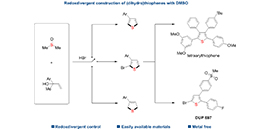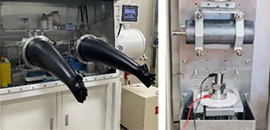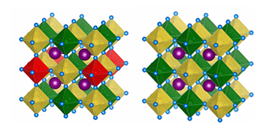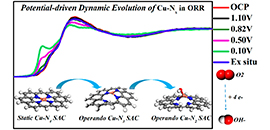Research News
-
 09 18, 2021Researchers Reveal Multi-path Mechanism in Electrochemical CO2 ReductionScientists synthesized a single-atom Pb-alloyed Cu catalyst (Pb1Cu), which showed high activity for the electrochemical CO2 reduction reaction (CO2RR) with a selectivity of 96% to formate and stability of up to 180 h at 100 mA cm-2.
09 18, 2021Researchers Reveal Multi-path Mechanism in Electrochemical CO2 ReductionScientists synthesized a single-atom Pb-alloyed Cu catalyst (Pb1Cu), which showed high activity for the electrochemical CO2 reduction reaction (CO2RR) with a selectivity of 96% to formate and stability of up to 180 h at 100 mA cm-2.
A research group led by Prof. XIAO Jianping from the Dalian Institute of Chemical Physics (DICP) of the Chinese Academy of Sciences (CAS) and their collaborators synthesized a single-atom Pb-alloyed Cu catalyst (Pb1Cu), which showed high activity for the electrochemical CO2 reduction reaction (CO2RR) with a selectivity of 96% to formate and stability of up to 180 h at 100 mA cm-2.
This study was published in Nature Nanotechnology on Sept. 16.
The researchers reported multi-path for CO2 reduction to formate, namely the reaction paths through COOH* and HCOO* intermediates. The reaction phase diagram was built based on the "energy global optimization" approach, describing the activity trend for CO2RR to formate. A double-peak activity trend was obtained owing to the consideration of multi-path.
They found that Cu preferred the COOH* path, resulting in the production of hydrocarbons and oxygenates, which exhibit limited selectivity and activity toward a specific product. However, Pb1Cu preferred the HCOO* path. The optimal HCOO* binding energy in Pb1Cu revealed either high activity or selectivity to formate via CO2RR. The agreement between experimental and theoretical activity trend confirms the reliability of multi-path mechanism.
The Cu site on the Pb1Cu step surface, rather than the single-atom Pb site, showed the highest CO2RR activity toward exclusive formate production. The free-energy diagram with the calculated electrochemical barriers also confirms the formate selectivity.
"The 'double-peak' describes a more accurate activity trend for CO2RR, providing a significant insight for catalyst design," said Prof. XIAO. -
 09 16, 2021Scientists Propose Redoxdivergent Strategy for Construction of (Dihydro)thiophenes with Dimethyl SulfoxideScientists developed a redoxdivergent construction of (dihydro)thiophenes with dimethyl sulfoxide (DMSO) as both an oxidant and a sulfur donor.
09 16, 2021Scientists Propose Redoxdivergent Strategy for Construction of (Dihydro)thiophenes with Dimethyl SulfoxideScientists developed a redoxdivergent construction of (dihydro)thiophenes with dimethyl sulfoxide (DMSO) as both an oxidant and a sulfur donor.
(Dihydro)thiophenes, one of the most common five-membered heterocycles, are widespread in a large number of natural products, functional materials, and biologically active compounds.
Sulfide sources are usually employed to prepare thiophene compounds through the formation of two new C–S bonds. However, the substrates employed are highly functionalized precursors, leading to limited scope and functional group compatibility.
Recently, a research team led by Prof. CHEN Qing'an from the Dalian Institute of Chemical Physics (DICP) of the Chinese Academy of Sciences (CAS) developed the redoxdivergent construction of (dihydro)thiophenes with dimethyl sulfoxide (DMSO) as both an oxidant and a sulfur donor.
This study was published in Angewandte Chemie International Edition on August 30.
Redoxdivergent construction of dihydrothiophenes, thiophenes and bromothiophenes respectively from readily available allylic alcohols,DMSO and HBr (Image by LIU Heng)
The researchers employed readily available allylic alcohols as starting materials and DMSO as mild oxidant to offer derivatives of (dihydro)thiophenes efficiently. They found that the manipulation of the selectivity could be governed by the dosage of DMSO and HBr.
In addition, they demonstrated that this strategy could realize programmable and concise synthesis of tetraarylthiophenes, bioactive DuP 697 and its regioisomers. It may serve as a general platform for achieving synthetically and medicinally useful five-numbered sulfur-containing heterocycles.
The research was supported by Dalian Institute of Chemical Physics, Dalian Outstanding Young Scientific Talent and the National Natural Science Foundation of China. (Text by Heng Liu) -
 09 14, 2021Scientists Develop In-situ Ion Battery 57Fe and 119Sn Mossbauer Instrument
09 14, 2021Scientists Develop In-situ Ion Battery 57Fe and 119Sn Mossbauer Instrument
A research group led by Prof. WANG Junhu from the Dalian Institute of Chemical Physics (DICP) of the Chinese Academy of Sciences developed in-situ ion battery 57Fe and 119Sn Mossbauer instrument. It can be used to dynamically observe the evolution of the Fe/Sn-based electrode materials in charging/discharging process, and to reveal the intrinsic mechanism of the ion battery.
Mossbauer spectroscopy with high energy resolution can be used to study the behavior of electrons outside the nucleus. The in-situ ion battery Mossbauer spectroscopy can be used to explore the changes of electronical, structural and magnetic properties of electrode materials under real working conditions.
To operate the instrument, first, place the research electrode material, diaphragm, electrolyte, and counter electrode into designed in-situ/operando battery in a glove box. And then Blue Electricity System and Mossbauer Spectrometer can work together to automatically record Mossbauer spectroscopy at certain intervals, measuring the charge/discharge performance and the time resolved Mossbauer spectrum at the same time.
The in-situ battery adopts a high-purity beryllium window with optimized thickness and diameter to ensure high transmittance of the Mossbauer signal, allowing sufficient pressure on the electrode and sufficient area for rapid data collection. Its internal geometry is suitable for vertical and horizontal Mossbauer measurement modes.
The group led by Professor LI Xianfeng and Associate Professor ZHENG Qiong from DICP and Dr. Moulay Tahar Sougrati from the University of Montpellier were also involved in this work. -
 09 10, 2021Identifying Activity Origin of Single-atom Catalyst through Atom-by-atom CountingScientists developed a methodology of electron-microscopy-based atom recognition statistic (EMARS) to directly identify the activity origin of Pt/Al2O3 industrial reforming catalyst through atom-by-atom counting of over 18,000 Pt atoms.
09 10, 2021Identifying Activity Origin of Single-atom Catalyst through Atom-by-atom CountingScientists developed a methodology of electron-microscopy-based atom recognition statistic (EMARS) to directly identify the activity origin of Pt/Al2O3 industrial reforming catalyst through atom-by-atom counting of over 18,000 Pt atoms.
A research group led by Prof. LIU Wei from the Dalian Institute of Chemical Physics (DICP) of the Chinese Academy of Sciences and their collaborators developed a methodology of electron-microscopy-based atom recognition statistic (EMARS) to directly identify the activity origin of Pt/Al2O3 industrial reforming catalyst through atom-by-atom counting of over 18,000 Pt atoms.
This study was published in Journal of the American Chemical Society on Sept. 8.
Atom dispersion in metal supported catalysts influences their catalytic activity, selectivity, and stability. Traditional spectroscopy methods can provide an averaged description about the atom dispersion, but they are not able to distinguish localized structure divergence.
The researchers re-defined the single-atom catalyst (SAC) dispersion through atom-by-atom counting with EMARS, and analyzed 18,000+ Pt atoms of Pt/Al2O3 catalyst at spatial range of 0.023 nm to 6 nm in aspects of precise statistics about the Pt-Pt distance and atom number contained in clusters.
Demonstration on advantages of EMARS for dispersion analysis of metal-supported catalyst (Image by ZHANG Fan)
They found that the activity for aromatics production was quantitatively correlated with the density of the supported Pt1 single atoms, but not all Pt1 sites, only those with Pt-Pt distances larger than 0.38 nm could efficiently facilitate aromatic producing. Pt clusters contributed no direct activity.
"The clusters in mono-layer dispersion could be re-dispersed via oxidation, serving as adaptive source to kinetically provide Pt1 sites, whereas other crystalline clusters inversely behaved as nucleation sites for Pt atoms sintering," said Prof. LIU.
Building a model catalyst of high homogeneity to understand the activity origin is not only technically challenging but also time-consuming. This work offers the possibility to directly identify the catalysis roles of different metal species in a practical catalyst via atom-resolved statistics.
The study was supported by the National Natural Science Foundation of China, Innovative Research Funds of DICP, and CAS Project for Young Scientists in Basic Research. (Image by ZHANG Fan) -
 09 08, 2021Scientists Design Lead-free Rare-earth-based Double Perovskite Nanocrystals with Near-infrared EmissionDICP scientists revealed the colloidal synthesis and exciton dynamics of all-Inorganic RE-based double perovskite nanocrystals with NIR emission.
09 08, 2021Scientists Design Lead-free Rare-earth-based Double Perovskite Nanocrystals with Near-infrared EmissionDICP scientists revealed the colloidal synthesis and exciton dynamics of all-Inorganic RE-based double perovskite nanocrystals with NIR emission.
Lead-free halide perovskite nanocrystals (NCs) with unique optical properties are promising in light-emitting diodes (LEDs), photodetectors, and solar cells.
Previous studies mainly focused on the photoluminescence (PL) in the visible region, and those on the near-infrared (NIR) PL of lead-free perovskite NCs are rare.
Recently, a research group led by Prof. HAN Keli from the Dalian Institute of Chemical Physics (DICP) of the Chinese Academy of Sciences (CAS), in collaboration with Prof. MIAO Xiangyang's group from Shanxi Normal University, designed colloidal synthesis of all-inorganic rare-earth-based double perovskite NCs with NIR emission, and revealed their exciton dynamics.
This study was published in Laser & Photonics Reviews on August 27.
NIR PL emission spectra and HRTEM images of Cs2NaEr0.5B0.5Cl6 NCs (Image by HAN Peigeng and WU Ruixiang)
The researchers synthesized all-inorganic rare-earth-based Cs2NaEr1-xBxCl6 (B: In, Sb, Bi; x = 0, 0.13, 0.5) double perovskite NCs by hot injection with variable temperature.
They found that all these NCs exhibited a NIR PL emission from 4I13/2 → 4I15/2 transition of Er3+, and on account of the incorporated Sb3+, Cs2NaEr0.5Sb0.5Cl6 NCs showed a 23-fold NIR PL enhancement with the average lifetime of 119.1 μs.
"The origin of NIR PL enhancement was attributed to the increase of exciton absorption, the longer PL lifetime, the suitable phonon-assisted process caused by the indirect band structure, and the process of long-lived dark trap state assisted NIR PL emission," said Prof. HAN.
This work was supported by the National Key Research and Development Program of China, the National Natural Science Foundation of China, and the Scientific Instrument Developing Project of CAS. (Text by HAN Peigeng and WU Ruixiang) -
 09 08, 2021Study Unveils Dynamic Behavior of Cu-N-C Single-Atom Catalysts in ElectrocatalysisDICP scientists synthetized a uniform and well-defined Cu-N-C single-atom catalyst (Cu-N-C SAC), and unveiled the dynamic behavior of Cu-N-C SAC during the ORR process with operando XAS technique.
09 08, 2021Study Unveils Dynamic Behavior of Cu-N-C Single-Atom Catalysts in ElectrocatalysisDICP scientists synthetized a uniform and well-defined Cu-N-C single-atom catalyst (Cu-N-C SAC), and unveiled the dynamic behavior of Cu-N-C SAC during the ORR process with operando XAS technique.
Atomically dispersed M-N-C (M refers to transition metals) materials are regarded as the most promising alternatives to the Pt-based precious-metal catalysts for the electrochemical reduction of oxygen (ORR). However, the genuine active sites in M-N-C still remain elusive.
Recently, Prof. ZHANG Tao's, Prof. WANG Aiqin's and Prof. YANG Xiaofeng's group from the Dalian Institute of Chemical Physics (DICP) of the Chinese Academy of Sciences (CAS), in collaboration with Prof. LI Jianfeng and Prof. TIAN Zhongqun from Xiamen University, synthetized a uniform and well-defined Cu-N-C single-atom catalyst (Cu-N-C SAC), and unveiled the dynamic behavior of Cu-N-C SAC during the ORR process.
This study was published in the Journal of American Chemical Society on August 31.
The operando XANES and proposed catalytic mechanism for the alkaline ORR on the Cu-N-C SAC (Image by YANG Ji)
Local coordination structure of SAC plays an important role in catalytic performance. The active site structure in SACs will undergo dynamic changes during the reaction.
The researchers prepared a uniform and well-defined Cu-N4 SAC that exhibited a comparable alkaline ORR activity to Pt/C. They found that the as-prepared Cu-N4 structure in Cu-N4 was firstly transformed to Cu-N3 structure driven by the applied potential, and then to HO-Cu-N2 structure under reaction conditions.
"These results provide a new vision to understand the reaction mechanism of M-N-C SACs as well as a guide to the rational design of more active SACs," said Prof. WANG Aiqin.
The above work was supports by the National Natural Science Foundation of China, the Strategic Priority Research Program of the CAS, the Dalian National Laboratory for Clean Energy (DNL) Cooperation Fund of CAS, and the BL14W at Shanghai Synchrotron Radiation Facility (SSRF). (Text by YANG Ji)